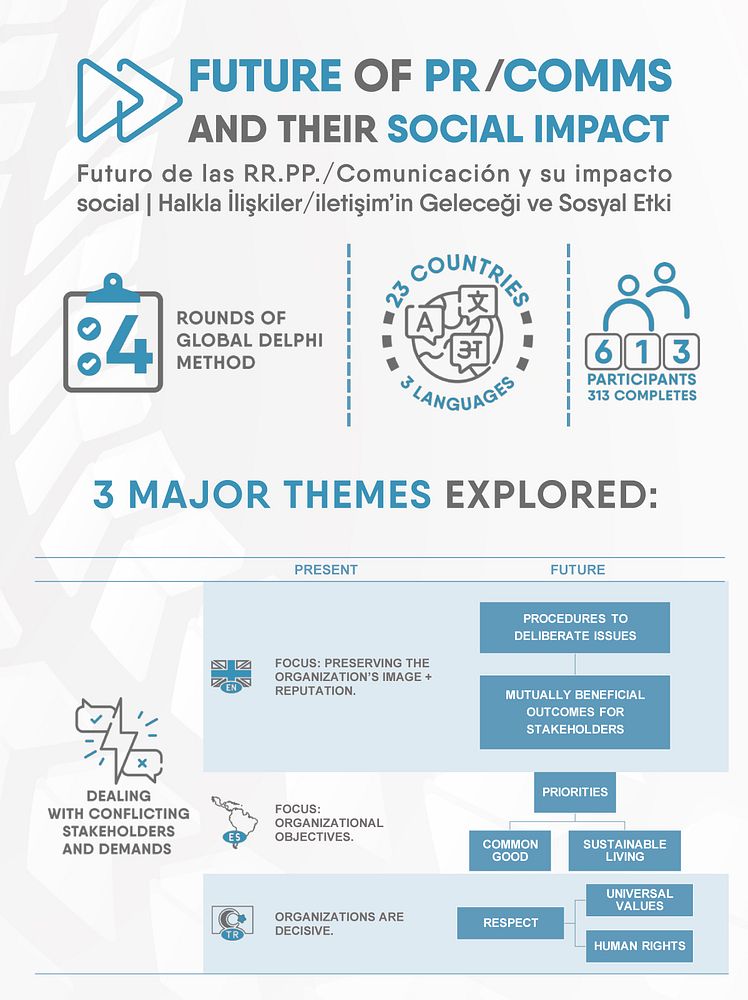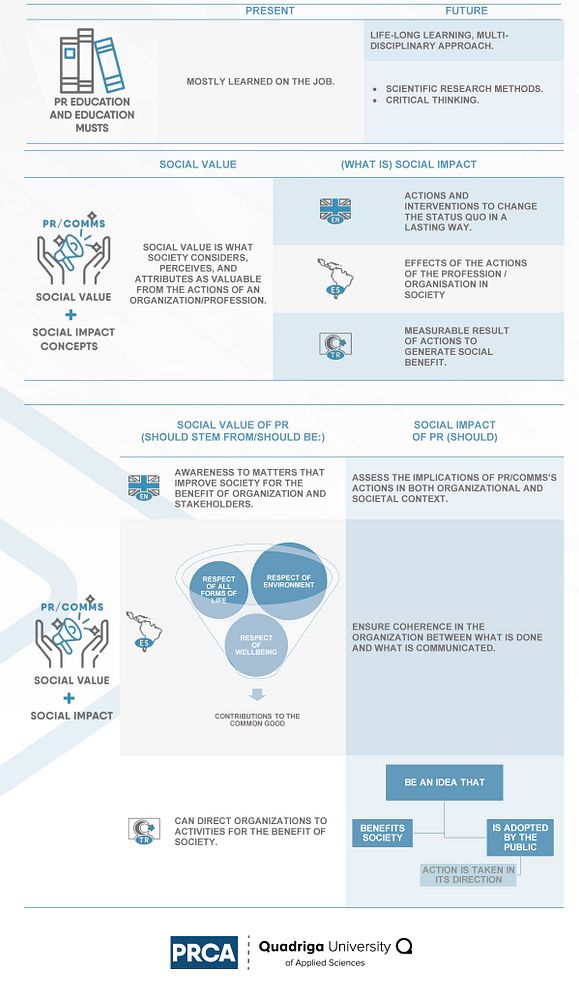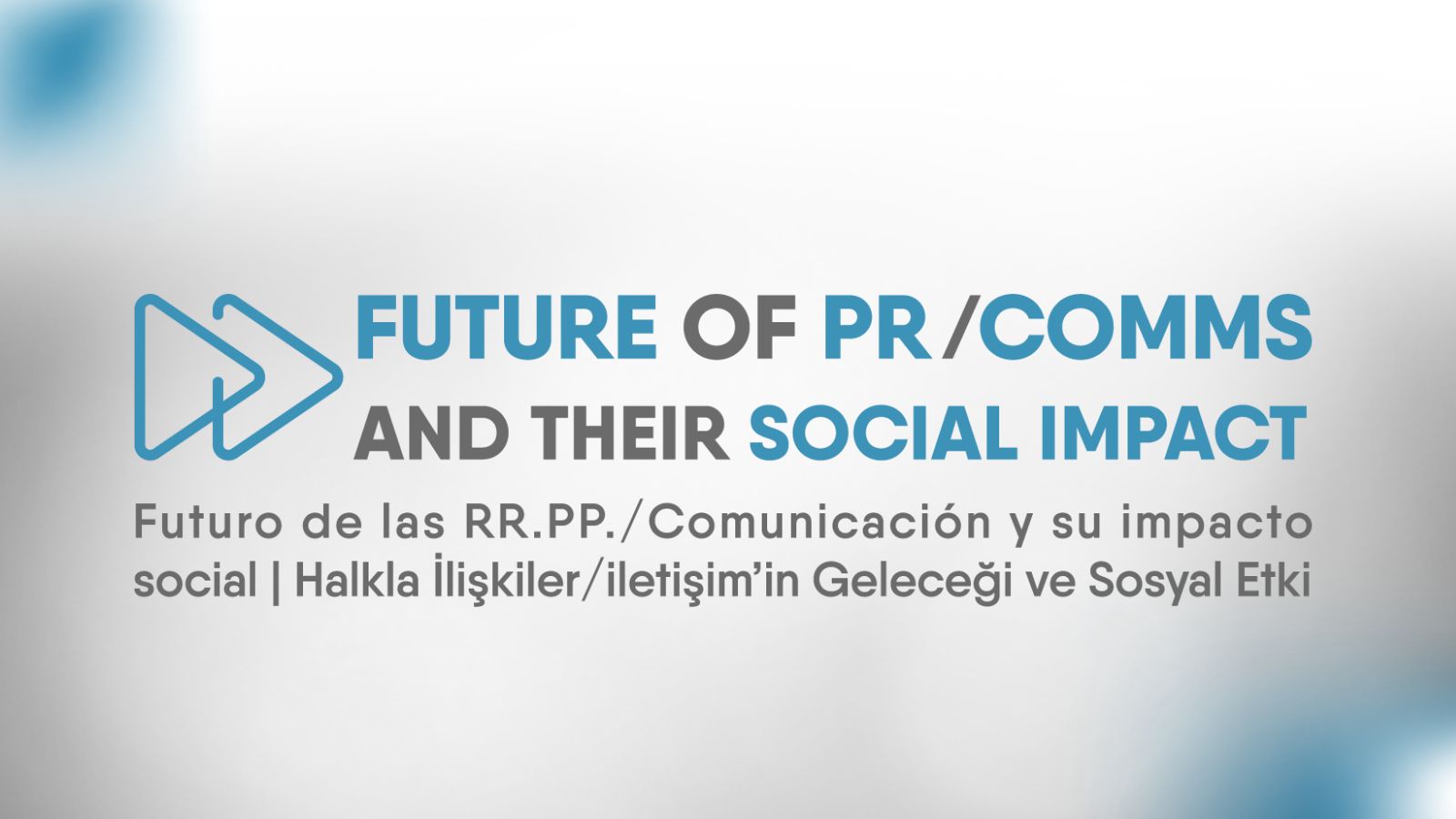The PRCA University Advisory Group and Quadriga University of Applied Sciences are thrilled to launch of their global report, ‘The Future of PR/Comms and their Social Impact.’ This comprehensive study engaged over 600 participants hailing from 23 countries and collected data in English, Spanish, and Turkish over the span of November 2022 to April 2023.
Coordinated by Dr. Ana Adi of Quadriga University of Applied Sciences and Thomas Stoeckle of Bournemouth University, this research delved into four major themes. It compared current practices with the desired, ideal, future practices, examining:
- Dealing with Conflicting Stakeholders and Demands
- Social Impact and Social Value including the Social Impact and Social Value of PR/Comms as Practice and Profession
- PR Education
To ensure the study’s rigor, 36 academics, educators, and practitioners actively participated, co-creating the research, testing it, identifying participants, coordinating national data collection efforts, and contributing to the analysis and dissemination of the study results.
While there were nuanced differences in how Spanish, Turkish, and English respondents interpreted the questions and framed their answers, social value was generally understood as “what society considers, perceives, and attributes as valuable from the actions of an organization/profession.” On the other hand, social impact was seen as “the measurable result of concrete, conscious, and deliberate activities to generate social benefit, which emerges as the product of socially valuable decisions of organizations.” This distinction means that social value is extrinsic, stakeholder-dependent, and perception-based, while impact can be organizationally driven.
Key Findings on Future Social Value of PR/Comms:
Participants who completed all four rounds of the study identified the following priorities for the future social value of PR/Comms:
- Bringing Awareness to Matters that Improve Society: In the English sample, 50% strongly agreed, and 41% agreed that PR/Comms should raise awareness about issues that benefit both organizations and stakeholders.
- Contributing to the Common Good: In the Spanish sample, 53% strongly agreed, and 42% agreed that PR/Comms should contribute to the common good, including environmental concerns, dignity, and human well-being both inside and outside organisations.
- Directing Organisations to Benefit Society: In Turkey, it was suggested by 22 participants that PR/Comms can direct organisations toward activities that benefit society.
Enhancing Social Impact Through PR/Comms:
To maximize social impact, participants recommended that PR/Comms should:
- Assess Implications: In the English sample, 64% agreed, and 24% strongly agreed that PR/Comms should assess the implications of their activities in the organisational and societal context.
- Ensure Coherence: In the Spanish sample, 68% strongly agreed, and 27% agreed that PR/Comms should ensure coherence between actions and communications within the organisation.
- Promote Beneficial Ideas: A group of 22 respondents suggested that PR/Comms should ensure that ideas benefiting society are adopted by the public and translated into action through information sharing and relationship building.


Dr. Ana Adi said:
“I am incredibly grateful to both the research team and the participants for their time, contribution, and effort. Even more so, as Delphi method studies are laborious and intensive for the participants and research alike. What we achieved is not only to set up a wide and diverse research network but also asked questions assumed to be uniformly understood and agreed upon internationally.”
Thomas Stoeckle said:
“Post pandemic, and in light of so many other grand challenges such as climate change, PR/Comms is called upon to live up to a higher level of social responsibility, beyond organizational interests. Not only is PR/Comms expected to play a role in the process, but it is expected to lead and drive innovation in the way that organizations and stakeholders (if not society at large) interact and make positive change happen. This is echoed throughout our sample, and it makes me optimistic for the future of the field.”
PRCA Managing Director Renna Markson said:
“Today’s launch of the ‘Future of PR/Comms and their Social Impact’ report represents a significant milestone in the evolution of our industry. This global study, a collaborative effort between the PRCA University Advisory Group and Quadriga University of Applied Sciences, underscores the pressing need for public relations and communications to transcend traditional boundaries and embrace a higher sense of social responsibility.
“As the study findings indicate, PR/Comms professionals must navigate a complex landscape, balancing the demands of stakeholders while driving meaningful social change. It’s evident that our field is called upon not just to participate in societal transformation but to lead it. The challenges of our time, from the aftermath of a global pandemic to the urgency of climate change, require nothing less.
“We applaud the researchers, educators, and practitioners who contributed to this pioneering effort and thank the participants from around the world who shared their insights.”
About Quadriga University of Applied Sciences:
Quadriga University of Applied Sciences Berlin is a state accredited, higher education institution focused on delivering executive education including MBAs with a specialism: Public Relations and Communication, Politics and Public Affairs, Human Resources and Organizational Development, as well as Coaching and Digital Transformation. As the University’s students are practitioners themselves, the courses offered have a high level of practical relevance supported by interdisciplinary research and a prestigious and international network. Quadriga University of Applied Sciences Berlin is part of the company Quadriga, the knowledge hub for excellent education, information and networking for Germany and beyond.


